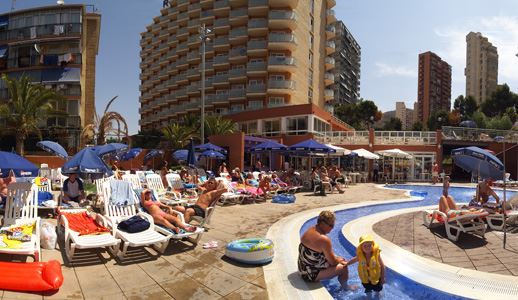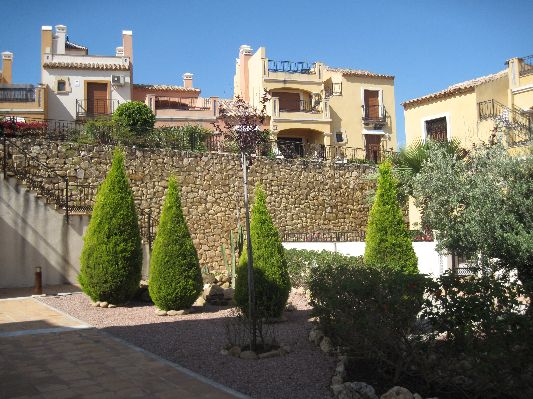Why shouldn't Brtish expats receive the Winter Fuel Allowance?
Thursday, February 28, 2013
There's a lot of press coverage - both in Spain and in the UK - about whether or not British expat pensioners should continue to receive the Winter Fuel Allowance. To my way of thinking, there's no contest - of course they should. What everyone seems to forget is that State pensions and allowances are not gifts to pensioners - it's what they've paid in for all their working lives through National Insurance contributions. Today's pensioners didn't have the option of leaving school and living off the State, so they worked from Day One.
Everywhere it seems, people complain about British expats who refuse to pay their dues to the Hacienda. We'd love to pay Income Tax in our adopted country, because we feel that would be the right thing to do, but as my husband Tony is a retired Civil Servant, his pension has to be paid in Sterling and taxed in the UK, so we have no options there.
Many people assume that because Civil Service pensions are non-contributory, pensioners get something for nothing, but that's not the case. Tony was a Civil Service employee from the day he left school and started his apprenticeship until he took early retirement at the age of 52, and every time he had a pay rise, part of it was kept back as a pension credit. We've got a pretty good pension, and a pretty good standard of living, but it wasn't handed to us on a plate.
The main argument against expats getting the Winter Fuel Allowance is that it's not needed in Spain, the land of Sun, Sea and Sangria. Obviously the people who put forward these arguments have never been here in January and February. As I write this, the gas fire is turned up full because the wind and rain in Spain isn't falling mainly on the plain today - it's here with us in Algorfa.
Electricity in the UK is expensive, but it's even more expensive here, and the Winter Fuel Allowance helps us to stay within budget. We left the UK because my joint problems and Tony's breathing issues meant that both of us were spending more time at the doctor's surgery than at home, and we were taking stupid amounts of medication. Spending winter in Spain means that both of us are much healthier, and we don't need industrial quantities of pain killers, inhalers and anti-inflammatory drugs to keep us going. We're probably saving the UK more on health services than they're paying us in Winter Fuel Allowance.
So to everyone who says we should give up the Winter Fuel Allowance, I say we've paid our dues - and continue to do so, as we're still paying Income Tax in the UK. Therefore, we're entitled to it - unlike people with fictitious wives and families who are bleeding the country dry with false benefit claims.

 0
Like
Published at 1:09 PM Comments (5)
0
Like
Published at 1:09 PM Comments (5)
Wrong word - wrong place!
Thursday, February 28, 2013
I'm gradually getting to grips with Spanish, but I have a vocabulary issue. I have no problem with conjugating verbs, which is a common stumbling block for many English speakers learning Spanish. I studied Latin at school, and at the time I never thought it would come in useful, but the principle of conjugating verbs which is also present in Latin helped enormously in the early days.
My problem is in remembering Spanish words that are totally different from their English, French or Italian equivalents. When I announced my intention to learn Spanish, one particular friend - who has delusions of adequacy in the banter department - told me all you had to do to learn Spanish was stick an 'o' on the end of any English word and say it with confidence. While it does actually work that way for some words - telephone and telefono comes immediately to mind - it's not always the case.
I'm getting better now, but in the early days, it was a real problem. We went to a Spanish restaurant, and my husband Tony wanted butter with his bread. I tried telling him that the Spanish don't do butter, except in cooking, but he's old and set in his ways, and he was having none of it. The waiter didn't speak any English at all, and I had yet to start on serious Spanish gathering, but I was confident I could manage that.
I called the waiter over - and then wondered what on Earth was the Spanish word for 'butter.' I'd only done the weekly supermarket trawl the day before, and it had registered that 'mantequilla' didn't sound very much like butter at all, but in the heat of the moment, I couldn't pull the word out of my wine-washed brain. I'm pretty fluent in French, and I remembered that many Spanish words are similar to French, but with an 'o' rather than an 'e' at the end - something of a variation on our friend's theme.
It was as if a light bulb flashed on in my brain. Butter is 'beurre' in French, so maybe it's 'burro' in Spanish. Haltingly, I asked the waiter for 'burro con pan' - 'butter with the bread,' or so I thought. He gave me a very funny look, and rushed off to fetch the restaurant owner, who - not unreasonably - wanted to know why I wanted to eat donkey meat with my bread! Luckily, his English was far superior to my Spanish, and when it was all explained, everyone had a good laugh.
We still use that restaurant, and whenever the owner sees us he pipes up, 'Quieres burro con pan, senora?' Thinking about it, maybe I foresaw the horsemeat scandal five years ago. That's my excuse, and I'm sticking to it!

 0
Like
Published at 11:56 AM Comments (2)
0
Like
Published at 11:56 AM Comments (2)
When English meets Spanish, the results can be hilarious!
Wednesday, February 27, 2013
I firmly believe that if you move to Spain, or spend a lot of time here, you should learn the language. I started to teach myself and I did pretty well - I'm a good teacher, and it was one-to-one after all. The trouble was, once I could 'get by,' other things took priority. Most people would be happy with getting by, and the first thing I taught myself was to ask for wine, cava, vodka and paella, so I had a handle on the really important stuff. However, I wanted to banter with the locals at the bar, so I joined a Spanish class.
Alan - the tutor - is English, but you'd never know it from his knowledge of the Spanish language and culture, and his pronunciation. He's missed his calling, because although he's a great teacher, he's also a very funny guy. We seem to spend half the lesson laughing at him or with him, and it seems to help with the absorption of irregular verbs, double negatives and all the other quirks of the language.
Part of the weekly homework consists of a translation which is designed to make full use of the vocabulary and grammar we've picked up, but it bears little relation to life in Spain - or anywhere else, for that matter. This week's masterpiece deals with dogs and cows playing chess, running through the streets with lions and hungry seals. If the demand for Spanish lessons dropped off, and he didn't fancy comedy, Alan could carve a new career for himself as a fantasy writer.
Yesterday, he surpassed himself. Alan always runs through the translation in case there is any new or forgotten vocabulary in there, and he reminded us that the Spanish word for seal is 'la foca.' Cue giggles from a class behaving more like naughty school kids than the expat pensioners most of us are. Sensing the prevalent mood, Alan delivered his masterstroke: 'And if one of the seals is lying on the rocks sunbathing, while the rest of the colony is catching fish for dinner, you might say he's a lazy foca!'

 0
Like
Published at 9:10 AM Comments (7)
0
Like
Published at 9:10 AM Comments (7)
Making the most of tomato paste
Wednesday, February 27, 2013
The first time we ever went to a family-run Spanish restaurant, we were served with bread, ali oli (garlic mayonnaise) and tomato paste while we waited for the salad. It seemed much more interesting than boring old butter, and of course, it was healthier. At that time, my Spanish wasn't up to dragging the recipe out of the waiter, but on my next shopping trip, I spotted tomato paste in the cold cabinet at Consum.
It was okay, but nowhere near as good as the restaurant version, and at just over a Euro for a small tub, it was hardly economical. A swift surf on the Internet turned up a recipe, and it's surprisingly easy to make. Just grate some tomatoes - yes, you heard that right. Simply rub the pointy end of the tomato over the grater teeth, and the skin will peel away gracefully to form a protective shield for your fingertips. Grating also helps you to get every bit of flesh from the tomato, but be sure to use a grater with an integrated bowl, or things could get very messy.
Once you have enough grated tomato, drizzle in some olive oil, and add freshly ground black pepper to taste. If the mixture seems a little slack, stir in a little tomato frito to bind it together. Tomato paste also makes a great breakfast spread on toast for tostada con tomate. I also add it to soups and stews as a thickening agent, or use it as a spread instead of butter.
I must tell you about my favourite sandwich. I spread one slice of wholemeal bread with tomato paste, and another with ali oli. Then I add tuna and sweetcorn for a tasty sandwich which is low on fat and calories. With the ali oli and tomato paste, you don't need to add extra mayonnaise to the tuna, and you're saving more calories by not using butter. The calories for the cava have to come from somewhere, don't they?
 
 0
Like
Published at 1:47 AM Comments (5)
0
Like
Published at 1:47 AM Comments (5)
El Dia Del Padre (Father's Day) 19 March
Wednesday, February 27, 2013
In England, there’s a joke that's so old, it has whiskers on, and it goes like this:
Q: When is Mother’s Day?
A: 9 months after Father’s Day!
The dates may different in Spain, but the same joke could be applied - if you were that desperate to raise a laugh. Father’s Day, or El Dia del Padre, is celebrated on 19 March, while Mother’s Day - El Dia de la Madre - is 8 December. As in many instances in Spain, these fiestas have religious as well as social connections.
Father’s Day in Spain is also the feast of St. Joseph. Of course, as Jesus’ father, Joseph is the most important father in history. Mother’s Day in Spain is not a moveable feast as it is in England. It's celebrated on the Feast of the Immaculate Conception, which Catholics believe is the date that Mary, mother of Jesus, was conceived. Both days are public holidays in Spain, although some regions may choose to take the 'red day' on a local saint's feast day instead of St Joseph’s Day.
In the week or so leading up to El Dia del Padre, children in Spanish schools will be busy making cards and gifts for their fathers. Grown up children living and working away from home will do their best to return home for the day. In Spain, the family is paramount - particularly at fiesta time.
In Valencia, 19 March sees the culmination of Las Fallas - a 4 day fiesta of fireworks, music and effigies which culminates in an enormous bonfire on March 19. The festival has its roots in the days when the carpenters of Valencia used to burn old wood and the wooden utensils they'd used throughout the winter to St Joseph, who of course was a carpenter as well as Jesus’ father.
Today, the whole emphasis is on fun, and Las Fallas is well worth a visit if you’re in Valencia in the middle of March. Be warned - it's going to be very loud! Spain is always noisy, but the level of decibels at Las Fallas is just short of a sonic boom!

 0
Like
Published at 12:30 AM Comments (2)
0
Like
Published at 12:30 AM Comments (2)
All inclusive breaks in Benidorm
Tuesday, February 26, 2013
Benidorm is the kind of place you either love or hate - or so I'm told. Personally, I rather like it. Although I wouldn't want to live there, I do enjoy visiting Benidorm every now and again, but a day never seems long enough to do everything we want to do. A couple of years ago, after an enjoyable lunch with friends, we hit on the idea of doing a short all inclusive break to give us time to sample Benidorm in all its glory. It's funny how a long, leisurely Spanish lunch and a few glasses of cava can crank up the thought process, isn't it?
Just before Christmas 2011, we booked a 4 night break at the Hotel Regente, in the centre of Benidorm, located midway between Levante Beach and the Market. With buses running into the Old Town in one direction, and Altea and Albir in the other, it's an ideal base for exploring Benidorm and the surrounding area.
We had a great time, and intended to return again, but life and stuff got in the way, and we never managed it. The end of January 2013 saw my husband Tony's 79th birthday. Not a landmark birthday, but as Tony says, at 79, every one's a bonus, so we decided to revisit the Regente with four friends and celebrate in style. We booked all inclusive, so we could really relax and enjoy ourselves.
For just 54 Euro per couple per night, we had three buffet meals, unlimited local wines, beers, spirits and soft drinks, as well as snacks in between times. There was also a full programme of entertainment every night. All we had to do was turn up at meal times, then find our way into the bar after dinner, and stagger to the lift some time around midnight. It's a tough job, but somebody has to do it!
It's quite easy to spend 54 Euro, or even more, on just one meal out with drinks, so our all inclusive break was fantastic value. Okay, we went out of season, but even in July and August, you can do all inclusive at the Regente for around 100 Euro per couple per night. There are literally hundreds of hotels to choose from in Benidorm, and others may prefer something closer to the action, but we liked the fact that we were convenient for all the amenities, but away from the main club area. I'd certainly recommend an all inclusive break in Benidorm for a special celebration, or just a break from routine. It's our neighbour's cat's birthday in May - maybe we'll go to Benidorm for another celebration!

 0
Like
Published at 11:48 PM Comments (0)
0
Like
Published at 11:48 PM Comments (0)
Hola from Algorfa, Costa Blanca
Tuesday, February 26, 2013
This is a big day for me, because it's my first post on my first ever blog, although as a freelance writer, I've written hundreds of blog posts for other people. So why - at the ripe old age of 60 - have I only just set up my own blog? Well, I'm an artist not a geek - I don't do technical in any shape or form. I'm also a coward, and I'm scared that people won't find me, and therefore won't read me. I'm hoping that at least one or two of Eye on Spain's 10,000 - and counting - daily visitors will find their way here, and point their friends in my direction.
What am I going to blog about? My work as a freelancer, life in Spain, learning the language, strange experiences and goings-on, and anything that strikes me as worth talking about. That gives me plenty of scope to find something of interest to all my readers. I'm going to pound away at the laptop keyboard for a few days so I don't have a naked blog up here, and then I'll aim to post something new several times a week. If you want me to write about something in particular, please ask, and I'll see what I can do. Tell me if you like what I write, and even more importantly, tell me if you don't like it. If I'm not writing what you want to read, we're all wasting our time.

 0
Like
Published at 10:53 PM Comments (4)
0
Like
Published at 10:53 PM Comments (4)
Spam post or Abuse? Please let us know
|
|